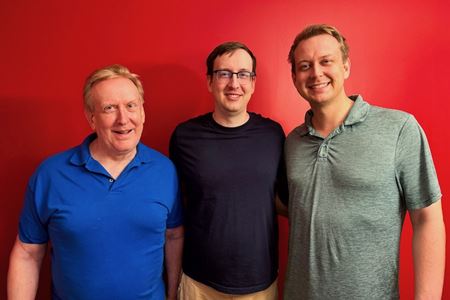“It’s a research award for some sort of project that relates to humanistic thought in medicine,” David explained.
Father and son spent an evening down the rabbit hole — digging far beyond the impressive stack of more recent accolades for Richard’s excellence in teaching — and eventually found the evidence they were seeking in photocopied minutes of the American Osler Society from 1988. Richard, too, had been a recipient of the William B. Bean award during his days as a medical student.
The discovery illustrates how two of his sons have forged their own paths while gravitating toward similar interests as polymath physicians.
Peter Gunderman, MD, MA, MTS, whose winding road to radiology included mid-med-school stints at Christian Theological Seminary and Duke Divinity School for a master’s in theology, recently joined his father on faculty at the IU School of Medicine. After completing his medical degree, Peter stayed at IU for residency training and completed a fellowship in cardiothoracic imaging before becoming an assistant professor of clinical radiology and imaging sciences in July 2024.
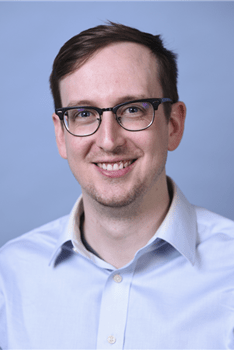 He said his theological studies broadened his appreciation for differing worldviews.
He said his theological studies broadened his appreciation for differing worldviews.
“It’s made me a more empathetic and selfless person, a bit more interested in other people and understanding of their priorities,” Peter said.
Richard, too, has a long-held interest in the intersection of medicine and theology — the topic of his Osler Society research back in 1988. In addition to an MD and a PhD from the Committee on Social Thought at the University of Chicago, Richard has received honorary doctorates from Garrett Theological Seminary at Northwestern University and Wabash College. He also earned a master’s in public health from IU.
Before enrolling at the IU School of Medicine, David got a PhD in mathematics from the University of Colorado Boulder and was the Lillian Gilbreth postdoctoral fellow at Purdue University. Collectively, the Gundermans have an impressive assortment of academic credentials behind their names.
“If you combine all those letters,” said Peter, “it actually spells ‘Voldemort.’” Dry humor is another family trait.
Richard said he never aimed to recruit any of his children into medicine or radiology, but the influence of having a physician father and a mother, Laura, who is a nurse, may have nudged them that way. Richard’s youngest son, John, is just beginning his academic journey as a freshman at DePauw University, and his daughter, Rebecca, owns an art studio in Zionsville, Indiana.
A shared love of boundless learning
Richard remembers being surprised when David pivoted from his original aspiration of becoming a mathematics professor and applied to medical school.
“I think we are all driven by a desire to help people,” David said. “A couple years ago, I came to the conclusion that the best opportunity to help people one-on-one, in real time, was as a physician.”
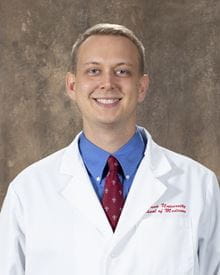 His mathematical training will come in handy when analyzing medical data. A common theme of the Gundermans’ career journeys is a desire for interdisciplinary connection while exploring questions of medicine.
His mathematical training will come in handy when analyzing medical data. A common theme of the Gundermans’ career journeys is a desire for interdisciplinary connection while exploring questions of medicine.
Richard is not only a professor of radiology, pediatrics and medical education, but he’s also an IU professor of philosophy, philanthropy, liberal arts and medical humanities. A 10-time recipient of the IU Trustees Teaching Award who received IU School of Medicine’s inaugural Inspirational Educator Award in 2015, Richard is also a prolific author with more than 1,000 published articles and 15 books. Not all of them focus on medicine. “We Come to Life with Those We Serve,” for example, explores “fulfillment through philanthropy” in the lives of icons like artist Vincent Van Gogh, founding father Benjamin Franklin and basketball coach John Wooden.
Richard has contributed to radiology education with titles like “Essential Radiology” and “Pediatric Imaging,” along with more than 750 keynote addresses, lectures and grand rounds presentations. He has been recognized as an outstanding educator by national organizations including the Radiological Society of North America, the American Roentgen Ray Society and the Association of American Medical Colleges.
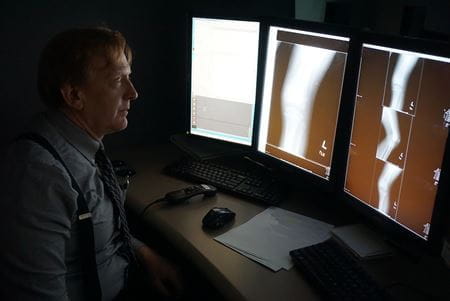 Over the years, Peter, David and Richard have collaborated on various research projects. One of those explored the sense of ownership radiology residents feel regarding their work.
Over the years, Peter, David and Richard have collaborated on various research projects. One of those explored the sense of ownership radiology residents feel regarding their work.
“Do you feel like you own the work you’re doing, and do you feel like it matters? Or are you a cog in a machine doing your required daily labor?” Peter explained of the project’s central questions. “In order to understand ownership, you need a definition, and you need a way to assess it. So, that’s what we did; we developed a tool to assess a sense of ownership.”
These are the sorts of inquiries that sprout from conversations in the Gunderman living room.
In September, the Gundermans' breadth of interdisciplinary expertise will expand yet further as they celebrate David’s marriage to Sara Kendrick, a fellow medical student at IU School of Medicine—West Lafayette who has master's degrees in biomedical engineering and electrical engineering. Peter’s wife, Tina Ahmadi, considered medical school before transitioning to education; she’s now a doctoral student at Ball State University on her way to a PhD in educational psychology.
How to Help Others 101
This year, David is serving as vice president of curriculum on the Medical Student Council at IU School of Medicine. Off campus, he serves on the board of trustees for Mental Health America Wabash Valley Region—Lafayette, which operates a national suicide hotline.
Both David and Peter mentor students exploring careers in medicine.
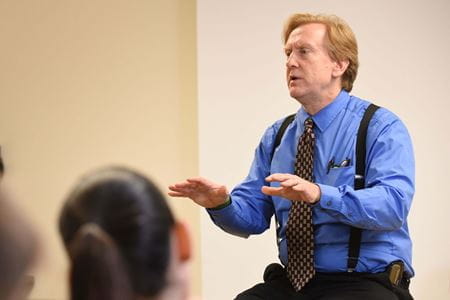 “Peter has advised dozens, maybe hundreds, of undergraduate students who have an interest in medicine and want to get into medical school,” said their proud father. “And David developed a course to help students who hadn’t done well in calculus. In many cases, thanks to that course, those students performed better, and some of them were actually able to get into medical school, though prospects for medicine looked pretty dim if they hadn’t figured out how to reverse their fortunes in mathematics.”
“Peter has advised dozens, maybe hundreds, of undergraduate students who have an interest in medicine and want to get into medical school,” said their proud father. “And David developed a course to help students who hadn’t done well in calculus. In many cases, thanks to that course, those students performed better, and some of them were actually able to get into medical school, though prospects for medicine looked pretty dim if they hadn’t figured out how to reverse their fortunes in mathematics.”
During his 27 years on faculty at the IU School of Medicine, Richard has mentored myriad trainees and inspired countless more colleagues across the world with his insights on humanizing medicine. When he was named the Spinoza Chair in Medicine by the Faculty of Humanities of the University of Amsterdam and invited to give a series of lectures as a visiting professor, Charles Bantz, chancellor at IUPUI from 2003-2015, said this:
“Richard is a stunning teacher and scholar. His lectures stretch disciplines, explore beliefs, challenge opinions and leave the listener asking questions more thoughtfully than before.”
Richard prefers to shine the spotlight on the growing accomplishments and societal contributions of his sons.
“These are two people who are not only doing well as a medical student and as a young faculty member, but they are people who, all along the way, are helping others,” Richard said. “I think that’s a really important message from their experiences.”
